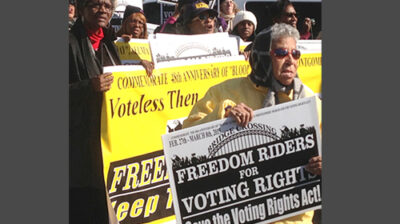
Shelby County v. Holder
What's at Stake
The Voting Rights Act of 1965 is one of our nation’s most critical federal civil rights statutes. Section 5 of the Voting Rights Act, which is a key element of the Act, requires certain jurisdictions that have a history of discriminatory voting practices to get advance approval from the federal government before changing their election laws.
Summary
On June 25, 2013, the Supreme Court struck down the coverage formula of Section 5 of the Voting Rights Act, a civil rights law that has protected the right to vote for people of color since 1965.
This case involves a constitutional challenge to Section 5 brought by Shelby County, Alabama. The ACLU intervened in the case on behalf of the Alabama State Conference of the NAACP and several African-American residents of Shelby County whose voting rights are directly impacted by the county’s challenge.
The U.S. Court of Appeals for the District of Columbia Circuit upheld the constitutionality of Section 5 of the Voting Rights Act as a proper exercise of Congress' power to protect against voting discrimination. Shelby County then sought Supreme Court review, which was granted. Oral argument took place on February 27, 2013. A decision is expected to be announced in June 2013.
Congress has extended the provisions of Section 5 on four separate occasions, most recently in 2006. The Supreme Court has upheld the original Voting Rights Act, and each of the prior extensions. Like its predecessors, the 2006 extension was based on an extensive legislative record documenting ongoing discrimination in the covered jurisdictions. According to the congressional report, without Section 5 "racial and language minority citizens will be deprived of the opportunity to exercise their right to vote, or will have their votes diluted, undermining the significant gains made by minorities in the last 40 years."
Legal Documents
-
09/21/2011
Shelby County v. Attorney General Holder - Memorandum Opinion
Date Filed: 09/21/2011
Download Document-
06/22/2010
Shelby County, Alabama v. Holder - Memo in Support of Motion
Date Filed: 06/22/2010
Download Document-
05/18/2012
Shelby County, Alabama v. Holder - Opinion of the US Court of Appeals for the District of Columbia Circuit
Date Filed: 05/18/2012
Download Document-
01/30/2013
Shelby County v. Holder - Brief for Respondent-Intervenors
Date Filed: 01/30/2013
Download DocumentPress Releases
Federal Appeals Court Upholds Voting Rights Act
ACLU Moves To Intervene In Alabama Voting Rights Act Challenge


